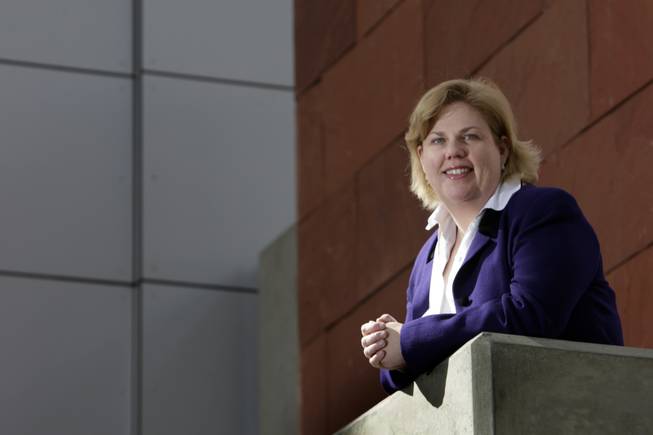Tuesday, March 2, 2010 | 2 a.m.
Sun Archives
Beyond the Sun
Adele Morris is a fellow and policy director at the Brookings Institution, which, in partnership with UNLV, runs the Brookings Mountain West think tank.
Her work focuses on energy and natural resource policies related to the economics of climate change. Brookings Mountain West brought her to the university last week.
How do you connect environmental and economic issues?
There is increased awareness now of the external costs of natural resources use. The market process can’t take certain things into account right now. Gasoline is a perfect example. You know how much you pay at the pump, but that price doesn’t reflect the costs to society.
Real costs are associated with that — health impacts from air and water pollution, national defense issues, the economic losses from environmental degradation and the impact of climate change.
These impacts all have a price eventually, and they all have to do with how we produce and consume energy. That’s why there’s such concern about finding alternatives to fossil fuels.
Where do you come into all this?
I’m looking at the most cost-effective way of reforming markets so those external costs are incorporated into the real costs. Alternatives to fossil fuels have issues too. They might be more expensive or take up wilderness lands or they’re financially risky. At this point, every alternative to fossil fuels comes with some kind of trade-off. That’s what the policy community is struggling with.
Other countries have been working toward reducing greenhouse gas emissions to alleviate climate change for years. Now the U.S. is trying to do a lot at once, like build giant solar plants in Nevada. Should the potential impacts be analyzed more before we cover the desert with photovoltaic panels and mirrors?
When you’re setting policy, you want to go to the problem. The objective isn’t solar power or conservation, it’s stopping climate change. The way to do that is to bring greenhouse gas emissions back into balance with the planet’s ability to absorb them. That requires reducing greenhouse gas emissions while increasing forests and other carbon sinks. Solar is just one part of a potential solution.
So how do we make this happen?
We need to fund basic research on new technologies that will help us limit greenhouse gas emissions, as we’ve been doing, but also fund research to take those concepts out of the labs and into the real world.
Most companies cannot do the research and development on their own. So there needs to be a commercial incentive to implement change. The most efficient way to do this is to put a price on carbon and greenhouse gas emissions.
Without that you’re stuck subsidizing renewable energy or imposing severe mandates. That’s much less cost-effective than taxing the thing you want less of.
When do you think we might see comprehensive climate change legislation?
The House has already passed a bill, but getting something through the Senate is a steeper climb. A lot depends on timing. A lot of other things have higher priority right now — creating jobs, banking issues, health care legislation and a war. Congress and the president have to deal with the most pressing issues first. In the end, it’s going to be harder to promote a bill that will, ultimately, raise energy rates. How do they get climate change to the top of the agenda when so many people have lost their jobs? The prospects for that legislation have deteriorated pretty quickly. The odds are not good.
So are we resigned to ecological disaster?
Climate change won’t be solved by the passage of one bill. It’s something we’re going to have to manage over hundreds of years.
The best outcome of whatever policy we implement is that nothing happens. That’s the most difficult thing about it. This is a long-term problem. It will keep coming up until we deal with it. That’s difficult in the current political climate. Moderates are scarce and the bases of the parties are miles apart. Eventually the public will demand action. But that doesn’t mean nothing should be done now.
We just need a more modest approach. That could mean more action on the state level or smaller steps at the national level. Making the costs more predictable would go a long way.


Join the Discussion:
Check this out for a full explanation of our conversion to the LiveFyre commenting system and instructions on how to sign up for an account.
Full comments policy